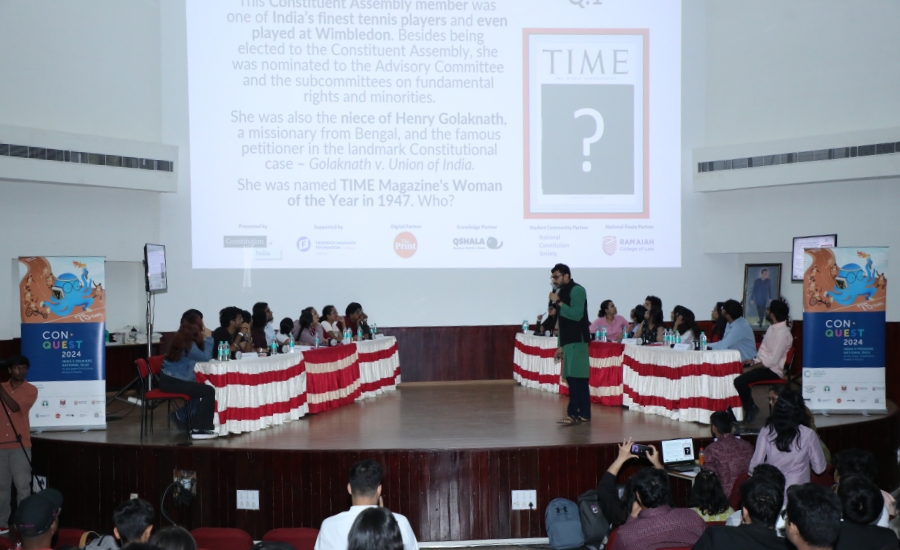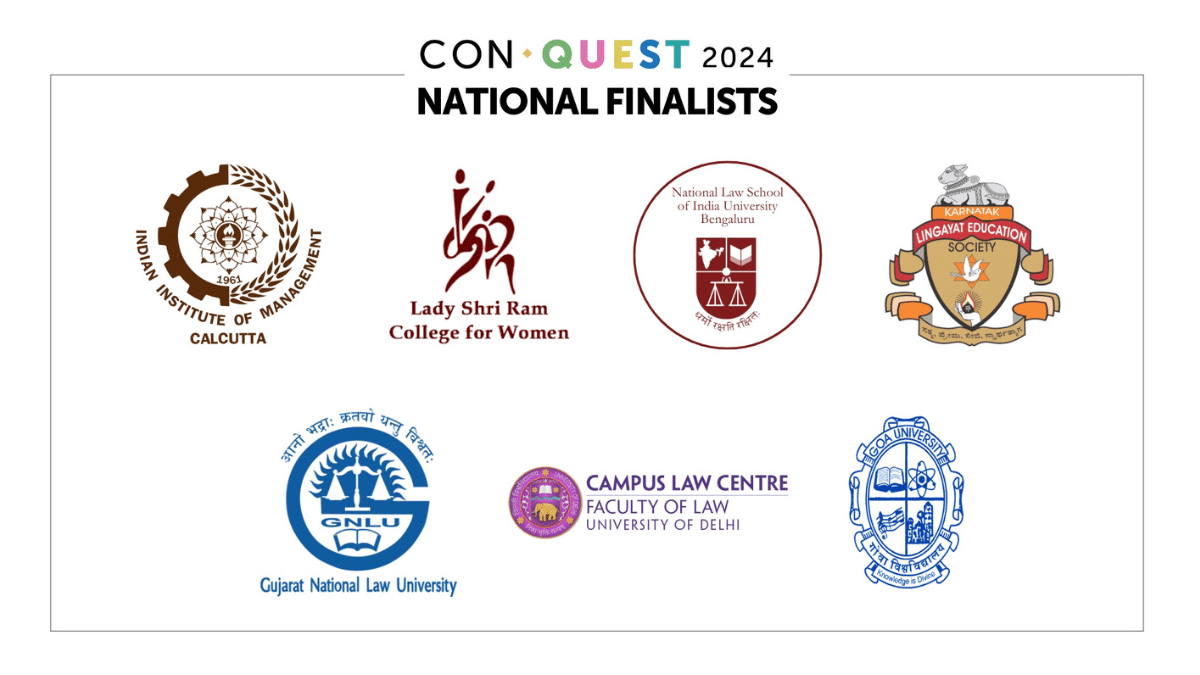
After five rounds of intense competition, the Campus Law Centre (CLC), Delhi University, emerged victorious, clinching the ConQuest 2024 Champions title. The National Finals, held on 6 December, were hosted by Ramaiah College of Law, Bengaluru. The Indian Institute of Management–Calcutta (IIM–Calcutta) Team 2 secured second place, while the National Law School of India University (NLSIU) finished third.
ConQuest, the flagship outreach initiative of the Centre for Law and Policy Research (CLPR) is organised in partnership with Constitutionofindia.net—the world’s largest and most comprehensive digital repository of India’s constitutional and political history. It includes a digitised, tagged, and searchable version of the Constituent Assembly Debates, making it an unparalleled tool for constitutional education.
The eighth edition of ConQuest commenced with the North Regional Round in New Delhi, followed by four regionals in Mumbai, Kolkata, and Bengaluru for the West, East, and South zones, respectively.
The top two teams from each region advanced to the National Finals. These included University of Delhi’s Lady Shriram College for Women and Campus Law Centre from the North region; and National Law School of India University and KLE Law College from the South. From the West, Goa University and the Gujarat National Law University made it to the finals. Two teams from the Indian Institute of Management–Calcutta (IIM-Calcutta) reached the finals held in Bengaluru.

The event saw over 1,200 participants and audiences, making it India’s largest educational event on the Constitution.
The Grand Finale comprised five rounds—Potpourri I, Potpourri II, List It, Connect the Dots, and On the Buzzer. Over the course of these rounds, Finalists engaged with key events, individuals, and moments that shaped India’s constitutional history, post-1950 developments, and contemporary legal issues.
The National Finals featured a wide array of thought-provoking questions, including those about Rajkumari Amrit Kaur, a member of the Constituent Assembly, a renowned tennis player, and the TIME magazine’s Woman of the Year in 1947.
Dr B.R. Ambedkar’s defence of the draft Constitution against criticisms by P.S. Deshmukh and B. Das, and the political safeguards proposed by Dr. Ambedkar and Rao Bahadur R. Srinivasan at the Round Table Conference for the protection of the depressed classes also featured among the top questions.
Participants were quizzed on notable figures such as Irawati Karve, India’s first woman anthropologist and sociologist. Karwe’s education was supported by Jivraj Mehta, the first Dewan of Baroda and husband of Hansa Mehta, a Constituent Assembly member.
Questions relating to contemporary affairs delved into a range of developments, including the Civil Rights Department’s 2020 lawsuit against Cisco Systems—a landmark case addressing caste discrimination in the US workplace. The 6 December quiz also included audio-visual segments, where participants had to identify Magsaysay Award winner T.M. Krishna’s music. His grand-uncle, T.T. Krishnamachari, was a member of the Constituent Assembly.
In the early Potpourri rounds of the quiz, teams were more or less neck and neck with similar scores. However, things began to change in the List It round, with IIM Calcutta Team 2 and CLC racing ahead. Finally, it was the CLC team that secured first place, IIM Calcutta Team 2, and the NLSIU Team followed at second and third place.

Hon’ble Justice K.N. Phaneendra distributed prizes and addressed the students on the importance of upholding and defending the Constitution. Prof. Umamahesh Sathyanarayan, Principal of Ramaiah College of Law, and Jayna Kothari, Senior Advocate and Executive Director at CLPR, also attended the event.
The victorious CLC were delighted at their win and iterated the significance of the events lining up to the drafting of the constitution, noting that it was “very important to understand where it all began”.
ConQuest 2024 was supported by the South Regional Office of the Friedrich Naumann Foundation. The questions were curated and collaboratively developed by Qshala and the Constitutionofindia.net team from CLPR.
This article appeared first on ThePrint, our ConQuest digital partner, on 13 December 2024.
